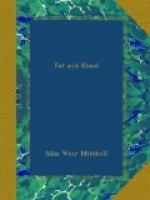“The last example with which I shall trespass on your patience I am tempted to relate because it is one of the most remarkable instances of the strange and multiform phenomena which neurotic disease may present, which it has ever been my lot to witness. The case must be well known to many members of the profession, since there is scarcely a consultant of eminence in the metropolis who has not seen her during the sixteen years her illness has lasted, besides many of the leading practitioners in the numerous health-resorts she has visited in the vain hope of benefit. My first acquaintance with this case is somewhat curious. About two months before I was introduced to the patient, chancing to be walking along the esplanade at Brighton with a medical friend, my attention was directed to a remarkable party at which every one was looking. The chief personage in it was a lady reclining at full length on a long couch, and being dragged along, looking the picture of misery, emaciated to the last degree, her head drawn back almost in a state of opisthotonos, her hands and arms clenched and contracted, her eyes fixed and staring at the sky. There was something in the whole procession that struck me as being typical of hysteria, and I laughingly remarked, ’I am sure I could cure that case if I could get her into my hands.’ All I could learn at the time was that the patient came down to Brighton every autumn, and that my friend had seen her dragged along in the same way for ten or twelve years. On January 14 of this year, I was asked to meet my friend Dr. Behrend in consultation, and at once recognized the patient as the lady whom I had seen at Brighton. It would be tedious to relate all the neurotic symptoms this patient had exhibited since 1864, when she was first attacked with paralysis of the left arm. Among them—and I quote these from the full notes furnished by Dr. Behrend—were complete paraplegia, left hemiplegia, complete hysterical amaurosis, but from this she had recovered in 1868. For all these years she had been practically confined to her bed or couch, and had not passed urine spontaneously for sixteen years. Among other symptoms, I find noted ‘awful suffering in spine, head, and eyes,’ requiring the use of chloral and morphia in large doses. ’For many years she has had convulsive attacks of two distinct types, which are obviously of the character of hystero-epilepsy.’ The following are the brief notes of the condition in which I found her, which I made in my case-book on the day of my first visit. ’I found the patient lying on an invalid couch, her left arm paralyzed and rigidly contracted, strapped to her body to keep it in position. She was groaning loudly at intervals of a few seconds, from severe pain in her back. When I attempted to shake her right hand, she begged me not to touch her, as it would throw her into a convulsion. She is said to have had epilepsy as a child. She has now many times daily, frequently as often as twice in an hour, both




